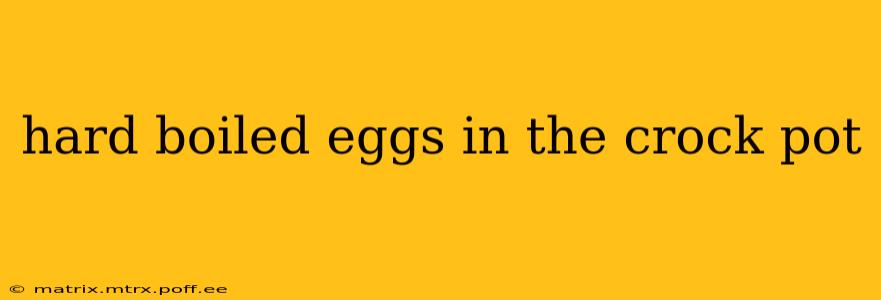Hard-boiling eggs can be a frustrating experience. Overcooked yolks, cracked shells, and inconsistent results are common complaints. But what if I told you there's a simpler, more reliable method? Using your slow cooker (crock-pot) to hard-boil eggs results in perfectly cooked eggs every time, minimizing the risk of cracks and ensuring even cooking. This method is especially helpful for large batches, making it ideal for meal prepping or parties.
Why Use a Crock-Pot for Hard-Boiled Eggs?
The crock-pot's gentle, even heat distribution is the key to its success. Unlike stovetop methods, where you risk uneven heating and cracking, the slow cooker provides a consistent temperature, leading to perfectly cooked eggs with easily peelable shells. This method also frees up your stovetop for other cooking tasks!
How to Hard-Boil Eggs in a Crock-Pot: A Step-by-Step Guide
What you'll need:
- Eggs (room temperature is best!)
- Enough water to cover the eggs by about an inch
- Crock-pot (any size will work, adjust water accordingly)
- Slotted spoon or tongs
Instructions:
- Place Eggs in Crock-Pot: Gently place your eggs in the bottom of your slow cooker. Avoid overcrowding.
- Add Water: Pour enough water into the crock-pot to cover the eggs by about an inch.
- Cook on Low: Cook on low for 2-3 hours. Cooking time may vary slightly depending on your crock-pot and the size of the eggs. For extra-large eggs, you may need to add 30 minutes to the cooking time.
- Ice Bath (Optional but Recommended): Once the cooking time is complete, carefully remove the eggs with a slotted spoon or tongs and immediately transfer them to an ice bath (a bowl of ice water). This stops the cooking process and makes peeling much easier.
- Peel and Enjoy: Once the eggs are cool enough to handle, gently tap them all over on a hard surface to create cracks in the shell. Then, peel under cold running water for easiest peeling.
How Long to Cook Hard-Boiled Eggs in a Crock-Pot?
The cooking time for hard-boiled eggs in a crock-pot is generally 2-3 hours on low. However, factors like the size of your eggs and the specific crock-pot model can slightly affect the cooking time. For larger eggs, add an extra 30 minutes to ensure they're fully cooked through. Always err on the side of caution and check for doneness if you're unsure. Overcooked eggs are still edible, but the yolks will be drier.
What Happens if I Overcook Hard-Boiled Eggs in the Crock-Pot?
Overcooked hard-boiled eggs will still be safe to eat, but the yolks will become dry and crumbly. The whites may also become rubbery. While not ideal, they're still perfectly safe for consumption, perhaps best suited for egg salad or deviled eggs where the texture isn't as critical.
Can I Use This Method for Soft-Boiled Eggs?
While this method primarily focuses on hard-boiled eggs, you can adapt it for soft-boiled eggs by significantly reducing the cooking time. Start by checking your eggs after 1 hour on low. The cooking time for soft-boiled eggs will be considerably shorter and will depend greatly on your preferred level of yolk doneness. Experimentation is key here!
Tips for Perfectly Peelable Hard-Boiled Eggs
- Use older eggs: Older eggs peel more easily than fresh eggs.
- Add a teaspoon of baking soda or vinegar to the water: This can help with easier peeling.
- Let the eggs cool completely: Rushing the peeling process can lead to broken eggs.
Conclusion: Enjoy Perfectly Cooked Eggs Every Time!
Using a crock-pot to hard-boil eggs provides a convenient and consistent method for achieving perfectly cooked eggs every time. With its gentle heat and even cooking, this method minimizes cracking and ensures easily peelable shells, making it a worthwhile addition to your egg-cooking repertoire. So, ditch the stovetop stress and embrace the simplicity of the slow cooker for all your hard-boiled egg needs!
